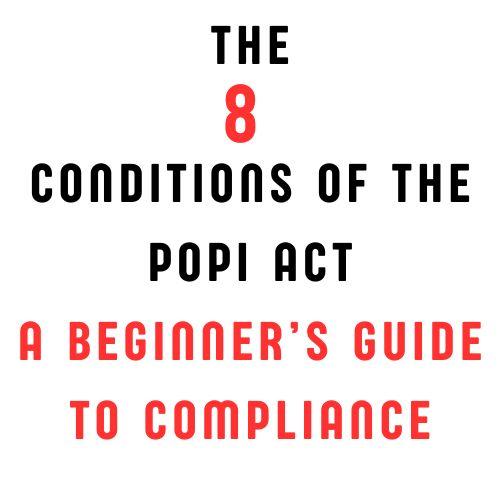The 8 Conditions of the POPI Act: A Beginner’s Guide to Compliance

In today’s digital world, data is one of your most valuable business assets — and also one of the most tightly regulated. If you're a South African business owner, understanding the Protection of Personal Information Act (POPIA) is no longer optional. It's a legal obligation. Fortunately, Legal Legends is here to simplify the legal jargon and help you achieve POPI Act compliance without the headache.
Whether you’re launching a new venture, applying for trademark registration, or consulting a business lawyer to scale your operations, understanding your responsibilities under POPIA is essential. In this post, we’ll break down the 8 core conditions of the POPI Act that every organisation must follow — in plain English.
Why Does the POPI Act Matter?
The POPI Act aims to protect personal information processed by public and private bodies. It gives individuals greater control over their data and places strict requirements on how businesses collect, store, and use that information.
Non-compliance isn’t just a slap on the wrist — it can lead to hefty fines, lawsuits, and serious damage to your business reputation. At Legal Legends, our range of legal services helps businesses of all sizes stay on the right side of the law.
Let’s dive into the 8 conditions for lawful processing of personal information under the POPI Act.
1. Accountability
Your organisation is responsible for complying with the POPI Act and must be able to demonstrate this compliance. That means having the right policies, training, and processes in place to manage personal information correctly.
Tip: Appoint an Information Officer and ensure they’re registered with the Information Regulator.
2. Processing Limitation
Only process personal information that is relevant, minimal, and collected lawfully. You cannot collect unnecessary data or use deceptive means to obtain it.
For example, if you're offering trademark registration services, you only need details necessary to complete that service — not more.
3. Purpose Specification
Information must be collected for a specific, explicitly defined, and lawful reason. You must also inform the data subject (the person whose data you're collecting) about this purpose at the time of collection.
For instance, if you’re collecting email addresses for marketing your legal services, you must disclose that purpose and obtain consent.
4. Further Processing Limitation
You can’t use the data for any purpose other than what it was originally collected for — unless further processing is compatible with the original purpose. So, if someone gives you their details for a legal consultation, you can’t use that info for unrelated marketing later on without permission.
5. Information Quality
You must ensure that personal information is complete, accurate, and up to date. This is especially critical for industries like legal and financial services, where decisions based on incorrect information can have serious consequences.
6. Openness
Transparency is key. When collecting personal information, you must notify the individual of who you are, why you’re collecting their data, and what will be done with it.
As a client-centric firm, Legal Legends always advises clients to implement clear privacy notices and consent forms to stay compliant.
7. Security Safeguards
This condition deals with data protection. You’re required to secure personal information against loss, unauthorised access, or damage. This includes physical and digital safeguards like encryption, firewalls, access control, and secure storage.
If a data breach occurs, you are legally required to notify both the Information Regulator and the affected individuals.
8. Data Subject Participation
Individuals have the right to access their personal information and request corrections or deletions. You must have procedures in place to handle such requests promptly.
Failing to respect data subject rights can lead to compliance issues — and damage your client relationships.
Getting POPI Act Compliance Right with Legal Legends
Whether you're a startup applying for trademark registration or an established enterprise navigating digital transformation, POPIA impacts your operations. Compliance is not just about ticking boxes; it's about building trust with your clients, employees, and stakeholders.
At Legal Legends, we offer tailored legal services to help your business:
-
Conduct a POPI compliance audit
-
Draft privacy policies and consent forms
-
Train staff on data protection
-
Manage data subject access requests
-
Appoint and train your Information Officer
We combine legal insight with practical business know-how, making us the go-to business lawyers for forward-thinking companies in South Africa.
Final Thoughts
POPI Act compliance doesn’t have to be overwhelming. By understanding the 8 core conditions and implementing sound data practices, you not only meet your legal obligations — you also build a brand that values integrity and privacy.
If you're unsure where to start or want expert legal guidance, Legal Legends is ready to help. Contact us today for a consultation and take the first step toward full compliance.
Need help with POPIA, contracts, or trademark registration? Trust the legal minds at Legal Legends — your modern-day business lawyer and compliance partner.
- Art
- Causes
- Crafts
- Dance
- Drinks
- Film
- Fitness
- Food
- Giochi
- Gardening
- Health
- Home
- Literature
- Music
- Networking
- Altre informazioni
- Party
- Religion
- Shopping
- Sports
- Theater
- Wellness



